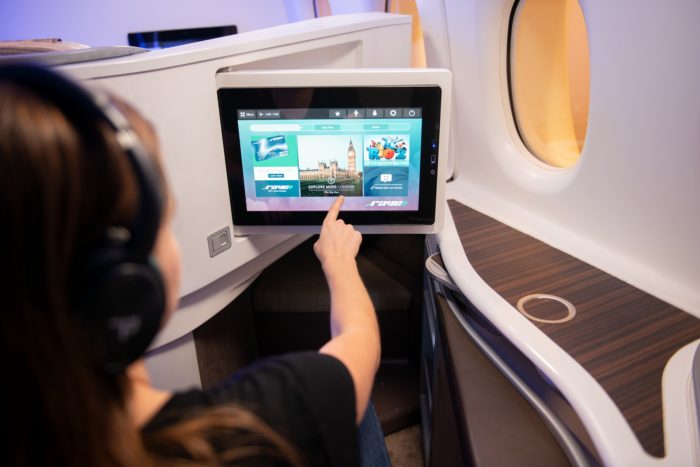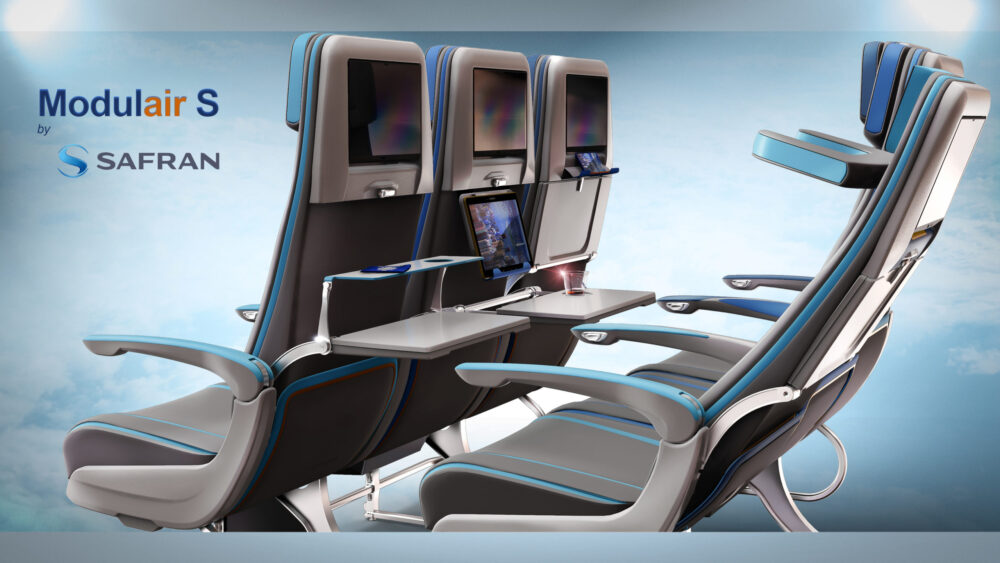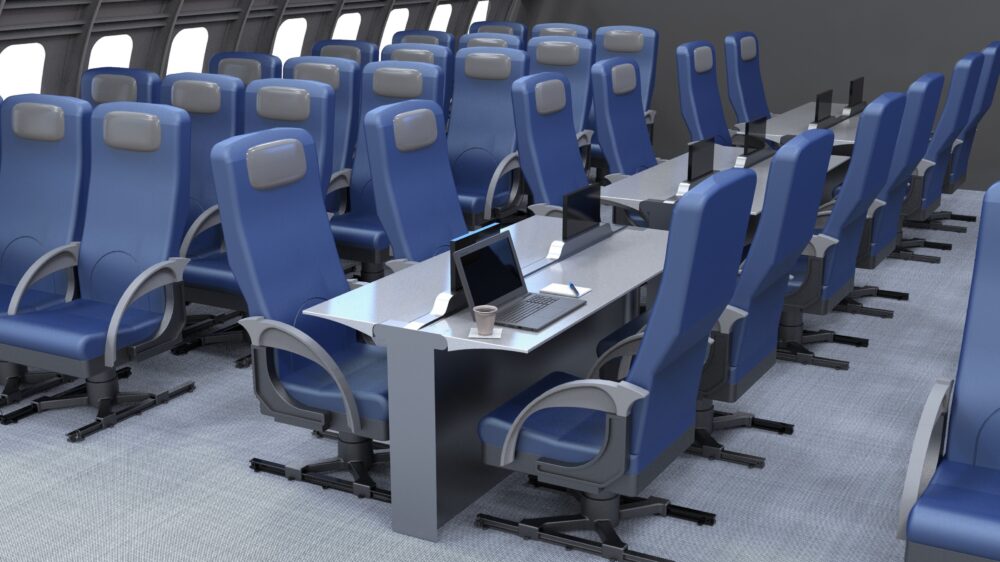The annual Crystal Cabin Awards throw some light on the future of aircraft cabin design. These prestigious awards bring together the most thoughtful, innovative and unusual designs aiming to make it onto the plane of the future. We take a look at this year’s winners to see what future travel could look like.

The 14th Crystal Cabin Awards
The annual Crustal Cabin Awards are something of an ‘Oscars’ for interior cabin design. Every year, the best, brightest and most innovative cabin projects are showcased for the awards, with a panel of judges assessing the entrants in a range of categories. The judging panel is made up of 27 individuals from around the world, including seating manufacturers, airline product managers and industry experts.
This year was the 14th Crystal Cabin Awards, and the winners were unveiled earlier this week, on March 30th. For the first time ever, the awards were livestreamed around the world due to current travel restrictions. 24 finalists were judged across eight categories – here’s who scooped the prizes.

Stay informed: Sign up for our daily and weekly aviation news digests.
Cabin concept – Eviation Alice
The award for cabin concepts is often the most interesting of all the awards. It showcases cabins that are forward-thinking and complete, at least in terms of design. This year’s winner is Eviation with its cabin concept for its all-electric commuter plane known as Alice.

Almadesign is the partner for the aircraft cabin, which features a 1-1 layout and asymmetric seats for maximum cloud gazing opportunities. The high-end product was first revealed at Paris Air Show in 2019. Here’s a portion of the Simple Flying team enjoying the luxurious space!

Two runners up were chosen in this category. The first was Virgin Atlantic for its ‘The Loft,’ which you can find onboard its new A350s. The second was Boeing’s ‘Sky Architecture’ concept for the 777X.
Visionary concepts – Airbus Airspace Cabin Vision 2030
The visionary concepts category is all about looking forward. It looks at the cabins of tomorrow and what we can expect from future flying experiences. This year’s winner was Airbus with its Airspace Cabin Vision 2030, featuring flexible seating, inflight lounges and transforming modules.

Airbus has designed this concept to provide a more personalized experience to passengers. Individuals would be able to select their facilities onboard based on their own requirements, such as when traveling with children, flying solo or on a business trip. The backbone of the concept is Airbus’ digital ambition, bringing the internet of things to the cabin for a more ground-like experience.

Runners up in this category were Arca’s Galley System, a reworking of the galley space with sustainability in mind, and AirGo’s Galaxy concept – a narrowbody lie-flat design that retains passenger density.
Materials and components – e2ip technologies
This category was won by Canadian company e2ip technologies, who have worked in partnership with the National Research Council of Canada to develop in-mold electronics. This encompasses surface-printed electrical circuits, thereby eliminating the need for heavy and complicated cabin electronics.

Greener cabin – Diehl Aviation
With airlines constantly seeking to reduce their impact on the environment, Diehl Aviation’s greywater recycling concept proved to be a winner at this year’s awards. The Greywater Reuse Unit makes it possible to reuse water from the handbasin to flush the toilet, something that makes much more sense than flushing potable water down the drain.

The result would be that aircraft wouldn’t need to carry as much water onboard, making the plane significantly lighter. For an average Boeing 787 flight, savings could amount to up to 550 tonnes of CO2 a year.

Runners up included ATR’s ‘Audioback’ system, which ensures those hard of hearing are able to receive announcements, and PriestmanGoode’s biodegradable meal tray.
Inflight entertainment and connectivity
While Bluetooth connectivity has become a part of life on the ground, congestion in the cabin’s crowded space has made it a difficult nut to crack in flight. Safran’s RAVE Bluetooth Audio has finally cracked that nut, and received a Crystal Cabin Award in the process.

The system allows multiple users to connect via Bluetooth to use wireless headphones, even in close proximity to one another. It uses protocol and antenna direction to allow seamless connectivity to the IFE, even if the user prefers to use their own headphones rather than the airline-provided solution.
A worthy runner up in this category was JetBlue with its multiscreen experience. Also awarded runner up was Spafax IQ, a product that provides analytics on inflight content engagement to help airlines improve their IFE offerings and customer understanding.
Passenger comfort hardware – Safran Modulair S
The Modulair seat is the economy seat that has thought of everything. The concept is essentially a set of modular comfort units that can be added to existing seats to improve the passenger experience. These include headrests, neck supports, tablet holders and more, and netted Safran a second Crystal Cabin Award.

One of the runners up in this category was Adient with its ‘Space For All’ or SFA concept. This is a seat extension for bulkhead passengers, which turns the row of three seats into a spacious family bed.

And the final runner up was the design from Irish developer Ciara Crawford, which aims to tackle the issue of independence for passengers with reduced mobility. Her Row 1 airport wheelchair concept would allow passengers to maintain their independence during the airport, boarding and flying experience.

Cabin systems – Safran SOPHY
The SOPHY smart trolley system does more than just track a trolley’s status and performance. This in itself is a new and emerging technology, but Safran has kicked it up a gear with this forward-looking concept. The hardware fits into a standard airline trolley, and allows the cart to collect and share data such as its load, maintenance needs and cleaning requirements. The technology netted Safran its third Crystal Cabin award this year!

Runners up in this category included SFS and Jetlite with the Lite2Fix concept. This is essentially an LED panel that can be used to create customer wellbeing enhancing lighting, as well as displaying passenger information and other graphics.

SITAONAIR was the second runner up with its ONAIR 4G connectivity solution. The concept is a next-generation connectivity product, with 3G and 4G technologies embedded. It is designed to solve the capacity issues faced by airlines with packed cabins, and lays the groundwork for 5G capabilities in the future.
University – University of Cincinnati’s Coffee House Cabin
The University category is a chance for students to show off their design acumen with innovative products and concepts. This year’s winner is the University of Cincinnati with its Coffee House Cabin, which features large central desks for workaholics to make good use of the long times spent on flights.

The tables feature charging ports, high-resolution screens and plenty of space for laptops and paperwork. Because seats need to face forward for taxi, takeoff and landing, they rotate around for these portions of the flight, while the tables fold down securely for safety.
Runners up included TU Delft with its collapsible beds designed for the flying V, and the University of Applied Sciences in Hamburg with an Isofix solution for traveling with babies and infants.
New categories for next year’s Crystal Cabin
With 2020s awards all wrapped up, we can start to look forward to 2021’s eye-opening entrants. In this coming year, two new categories will also make an appearance – Clean & Safe Air Travel and a Judges Choice Award. The awards ceremony is scheduled to take place in August at the Aircraft Interiors Expo.
[ad_2]
Source link


